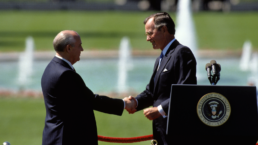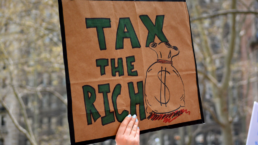In the wake of his death, the former Soviet leader has been given warm tributes in the US. But there’s precious little discussion of Gorbachev’s strong criticisms of US foreign policy or his warnings about the danger of US arrogance.
By Branko Marcetic, Current Affairs
When a major political figure dies, it’s always significant what’s singled out for forgetting. That’s the case with former president of the Soviet Union Mikhail Gorbachev, who’s been lionized in the Western press since his death last week, lauded for his efforts to democratize and bring new freedoms to the former USSR, and whose legacy has now been reduced to tatters by Russian president Vladimir Putin.

World leaders praised him. U.S. president Joe Biden feted Gorbachev as “a man of remarkable vision.” UK Labour Party leader Keir Starmer said he was “one of the great figures of the 20th century.” The president of the European commision said he was someone whose legacy is “one we will not forget.” Former U.S. Ambassador to Russia Michael McFaul called him “a figure who made the world better” and urged us to “learn from his legacy.” “Putin seems to view himself as the anti-Gorbachev,” writes David Remnick of the New Yorker, expressing his hope that “around the world,” Gorbachev’s belief in “democracy, the rule of law, and the peaceful and orderly transfer of power” would “prevail.” Putin’s pointed refusal to attend Gorbachev’s funeral became something of a mini-scandal in the West since his death.
This is largely in line with how the Western press has treated Gorbachev over the last ten years especially, when the former Soviet minister had offered mounting criticism of Putin’s authoritarianism at home. There’s no shortage of coverage of Gorbachev slamming the Russian president, warning of the return of Stalinism and totalitarianism, or his criticisms of dubious Russian elections, points the former Soviet president has made again and again over the years.
But there’s another, overlooked element of Gorbachev’s legacy, one that’s as absent from today’s eulogies as it was ignored by officials when he was alive. That’s Gorbachev’s harsh criticism of U.S. foreign policy after the end of the Cold War, particularly toward Russia, along with his frequent warnings that the decision-making in Washington was destabilizing the world, and his urgent demands that the United States and Russia engage in robust diplomacy. It’s not hard to see why this has been erased: many of Gorbachev’s points are today dismissed in the West purely as Putin apologism and pro-war excuse-making.
Recent Posts
Schumer, Jeffries Refuse to Join Democrats’ Growing Calls to Slash ICE Spending
January 10, 2026
Take Action Now “I just don’t understand how we provide votes for a bill that funds the extent of the depravity,” said Sen. Chris Murphy.By Julia…
Billionaire’s Mouthpiece Searches For Reasons To Avoid Taxing Billionaires
January 9, 2026
Take Action Now California is considering a referendum on whether to impose a one-time wealth tax on the state’s billionaires.By Jim Naureckas,…
All Democratic Presidential Candidates In 2028 Should Commit To Dismantling ICE
January 8, 2026
Take Action Now Since its inception, ICE has been designed to conflate issues of immigration with terrorist threats against the U.S.By Sam…
Trump Cuts Billions In Federal Childcare Funds For Democratic-Led States After Minnesota Fraud Scandal
January 8, 2026
Take Action Now Administration cites welfare fraud allegations as advocates and state leaders warn of political retaliation and sweeping harm to…




